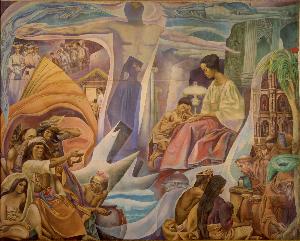Carlos Modesto Villaluz Francisco
Carlos Modesto Villaluz Francisco;Carlos V. Francisco
Place: Angono
Born: 1912
Death: 1969
Biography:
A Pioneer in Filipino Modernism
Carlos Modesto 'Botong' Villaluz Francisco, a renowned Filipino muralist from Angono, Rizal, left an indelible mark on the art world. As one of the first Filipino modernists, his historical pieces continue to captivate audiences.
Early Life and Career
Born in 1912, Francisco's artistic journey began with a passion for capturing the essence of Philippine culture. His work served as a bridge between traditional and modern art forms, earning him the nickname 'Botong.'
Notable Contributions
* **Production Designer**: Francisco played a pivotal role in the 1961 film adaptation of José Rizal's Noli Me Tángere, bringing the story to life through his art. * **Discovery of Angono Petroglyphs**: In 1965, he discovered the Angono Petroglyphs, a significant archaeological find that shed light on the Philippines' ancient history.
Artistic Masterpieces
Some of Francisco's most notable works include:
- Progress through Education (Fukuoka Asian Art Museum, Japan), a mural depicting the arrival and spread of education in the Philippines.
- The Blood Compact, a historical piece showcasing the country's complex past.
- Bayanihan, a representation of the Filipino spirit of unity and cooperation.
Legacy and Restoration
Francisco's later work, Camote Diggers, was left unfinished at the time of his passing in 1969. Many of his murals have undergone restoration, including The Progress of Medicine in the Philippines, now residing in the National Art Gallery of the Philippines.
Influence and Remembrance
As a pioneer in Filipino modernism, Francisco's art has inspired generations of artists. His legacy continues to be celebrated through his works, which can be found in various museums and galleries, including those featured on Wikioo.org's platform.
- View more of Francisco's artwork on Wikioo.org's Carlos Modesto Villaluz Francisco page.
- Explore the Fukuoka Asian Art Museum's collection, featuring Progress through Education, on Wikioo.org's museum page.
- Discover more about Filipino art and culture on Wikipedia's Philippine Literature and the Revolution page.
Remembering a Legacy:
Carlos Modesto Villaluz Francisco's artistic contributions continue to enrich the cultural landscape of the Philippines, inspiring future generations with his historical pieces and modernist approach.

